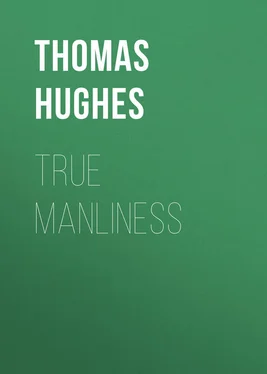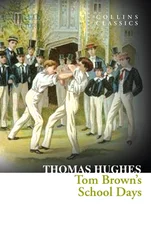Thomas Hughes - True Manliness
Здесь есть возможность читать онлайн «Thomas Hughes - True Manliness» — ознакомительный отрывок электронной книги совершенно бесплатно, а после прочтения отрывка купить полную версию. В некоторых случаях можно слушать аудио, скачать через торрент в формате fb2 и присутствует краткое содержание. ISBN: , Жанр: foreign_prose, на английском языке. Описание произведения, (предисловие) а так же отзывы посетителей доступны на портале библиотеки ЛибКат.
- Название:True Manliness
- Автор:
- Жанр:
- Год:неизвестен
- ISBN:http://www.gutenberg.org/ebooks/52534
- Рейтинг книги:5 / 5. Голосов: 1
-
Избранное:Добавить в избранное
- Отзывы:
-
Ваша оценка:
- 100
- 1
- 2
- 3
- 4
- 5
True Manliness: краткое содержание, описание и аннотация
Предлагаем к чтению аннотацию, описание, краткое содержание или предисловие (зависит от того, что написал сам автор книги «True Manliness»). Если вы не нашли необходимую информацию о книге — напишите в комментариях, мы постараемся отыскать её.
True Manliness — читать онлайн ознакомительный отрывок
Ниже представлен текст книги, разбитый по страницам. Система сохранения места последней прочитанной страницы, позволяет с удобством читать онлайн бесплатно книгу «True Manliness», без необходимости каждый раз заново искать на чём Вы остановились. Поставьте закладку, и сможете в любой момент перейти на страницу, на которой закончили чтение.
Интервал:
Закладка:
Gird yourself, then, for the fight, my young brother, and take up the pledge which was made for you when you were a helpless child. This world, and all others, time and eternity, for you hang upon the issue. This enemy must be met and vanquished – not finally, for no man while on earth, I suppose, can say that he is slain; but, when once known and recognized, met and vanquished he must be, by God’s help, in this and that encounter, before you can be truly called a man; before you can really enjoy any one even of this world’s good things.
XXIV
In the course of my inquiries on the subject of muscular Christians, their works and ways, a fact has forced itself on my attention, which, for the sake of ingenious youth, ought not to be passed over. I find then, that, side by side with these muscular Christians, and apparently claiming some sort of connection with them (the same concern, as the pirates of trade-marks say) have risen up another set of persons, against whom I desire to caution my readers. I must call the persons in question “musclemen,” as distinguished from muscular Christians; the only point in common between the two being that both hold it to be a good thing to have strong and well-exercised bodies, ready to be put at the shortest notice to any work of which bodies are capable, and to do it well. Here all likeness ends; for the “muscleman” seems to have no belief whatever as to the purposes for which his body has been given him, except some hazy idea that it is to go up and down the world with him, belaboring men and captivating women for his benefit or pleasure, at once the servant and fomenter of those fierce and brutal passions which he seems to think it a necessity, and rather a fine thing than otherwise, to indulge and obey. Whereas, so far as I know, the least of the muscular Christians has hold of the old chivalrous and Christian belief, that a man’s body is given him to be trained and brought into subjection, and then used for the protection of the weak, the advancement of all righteous causes, and the subduing of the earth which God has given to the children of men. He does not hold that mere strength or activity are in themselves worthy of any respect or worship, or that one man is a bit better than another because he can knock him down, or carry a bigger sack of potatoes than he. For mere power, whether of body or intellect, he has (I hope and believe) no reverence whatever, though, cæteris paribus , he would probably himself, as a matter of taste prefer the man who can lift a hundred-weight round his head with his little finger to the man who can construct a string of perfect Sorites.
XXV
As a rule, the more thoroughly disciplined and fit a man may be for any really great work, the more conscious will he be of his own unfitness for it, the more distrustful of himself, the more anxious not to thrust himself forward. It is only the zeal of the half-instructed when the hour of a great deliverance has come at last – of those who have had a glimpse of the glory of the goal, but have never known or counted the perils of the path which leads to it – which is ready with the prompt response, “Yes – we can drink of the cup, we can be baptized with the baptism.”
XXVI
How can we be ever on the watch for the evil which is so near us? We cannot; but one is with us, is in us, who can and will, if we will let him.
Men found this out in the old time, and have felt it and known it ever since. Three thousand years ago this truth dawned upon the old Psalmist, and struck him with awe. He struggled with it; he tried to escape from it, but in vain. “Whither shall I go,” he says “from thy Spirit? or whither shall I flee from thy presence? If I ascend up into heaven, thou art there: if I make my bed in hell, behold thou art there. If I take the wings of the morning, and dwell in the uttermost parts of the sea; even there shall thy hand lead me, and thy right hand shall hold me.”
Is any of us stronger or wiser than the Psalmist? Is there any place for us to flee to, which was not open to him? My brethren, had we not better make up our minds to accept and acknowledge the truth, to which our own consciences bear witness, that not only in heaven, and in hell, and in the uttermost parts of sea and earth, He is present, but that in the inmost recesses of our own hearts there is no escape from his Spirit – that He is there also, sustaining us, pleading with us, punishing us.
We know it by the regret we feel for time wasted and opportunities neglected; by the loathing coming back to us, time after time, for our every untrue, or mean thought, word, or deed; by every longing after truth, and righteousness, and purity, which stirs our sluggish souls. By all these things, and in a thousand other ways, we feel it, we know it.
Let us, then, own this and give ourselves up to his guidance. At first it will be hard work; our will and spirits will be like a lump of ice in a man’s hand, which yields but slowly to the warm pressure. But do not despair; throw yourselves on his guidance, and he will guide you, he will hide you under his wings, you shall be safe under his feathers, his faithfulness and truth shall be your shield and buckler.
The ice will melt into water, and the water will lie there in the hollow of the hand, moving at the slightest motion, obeying every impulse which is given to it.
My brethren, the Spirit of God which is in every one of us – the spirit of truth and love unchangeable – will take possession of our spirits, if we will but let him, and turn our whole lives into the lives of children of God, and joint-heirs of heaven with his Son.
XXVII
“As the world was plastic and fluid in the hands of God, so it is ever to so much of his attributes as we bring to it,” may be a startling saying of Mr. Emerson’s, but is one which commends itself to our experience and reason, if we only consult them honestly. Let us take the most obvious examples of this law. Look at the relations of man to the brute creation. One of us shall have no difficulty in making friends of beasts and birds, while another excites their dread and hate, so that even dogs will scarcely come near him. There is no need to go back to the traditions of the hermits in the Thebaid, or St. Francis of Assisi, for instances of the former class. We all know the story of Cowper and his three hares, from his exquisite letters and poem, and most of you must have read, or heard of the terms on which Waterton lived with the birds and beasts in his Yorkshire home, and of Thoreau, unable to get rid of wild squirrels and birds who would come and live with him, or from a boat, taking fish which lay quietly in his hand till he chose to put them back again into the stream. But I suppose there is scarcely one of us who has not himself seen such instances again and again, persons of whom the old words seemed literally true, “At destruction and famine thou shalt laugh; neither shalt thou be afraid of the beasts of the earth. For thou shalt be in league with the stones of the field, and the beasts of the field shall be at peace with thee.”
I remember myself several such; a boy who was friends even with rats, stoats, and snakes, and generally had one or other of them in his pockets; a groom upon whose shoulders the pigeons used to settle, and nestle against his cheeks, whenever he went out into the stable-yard or field. Is there any reasonable way of accounting for this? Only one, I think, which is, that those who have this power over, and attraction for, animals, have always felt toward them and treated them as their Maker intended – have unconsciously, perhaps, but still faithfully, followed God’s mind in their dealings with his creatures, and so have stood in true relations to them all, and have found the beasts of the field at peace with them.
Читать дальшеИнтервал:
Закладка:
Похожие книги на «True Manliness»
Представляем Вашему вниманию похожие книги на «True Manliness» списком для выбора. Мы отобрали схожую по названию и смыслу литературу в надежде предоставить читателям больше вариантов отыскать новые, интересные, ещё непрочитанные произведения.
Обсуждение, отзывы о книге «True Manliness» и просто собственные мнения читателей. Оставьте ваши комментарии, напишите, что Вы думаете о произведении, его смысле или главных героях. Укажите что конкретно понравилось, а что нет, и почему Вы так считаете.












